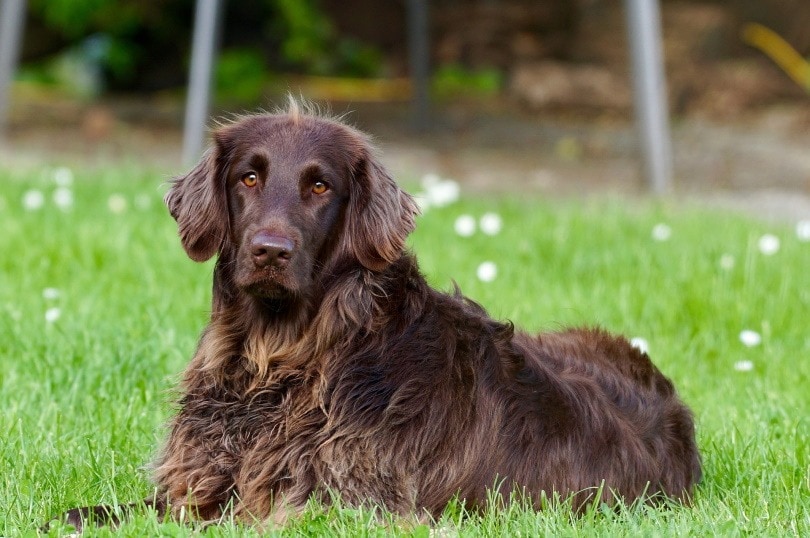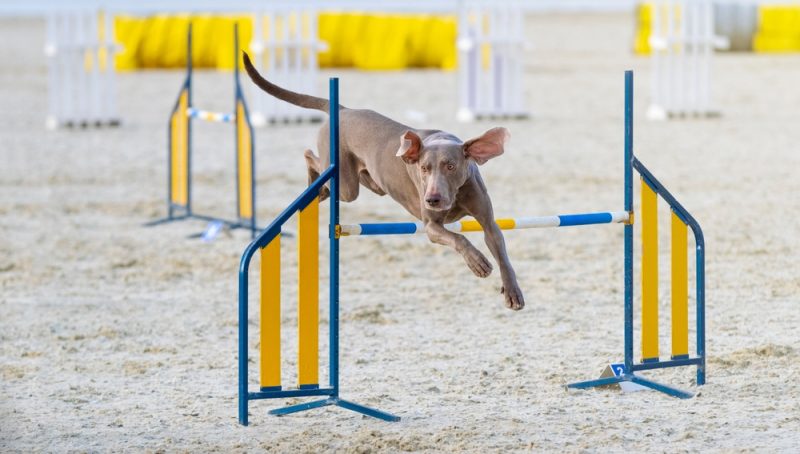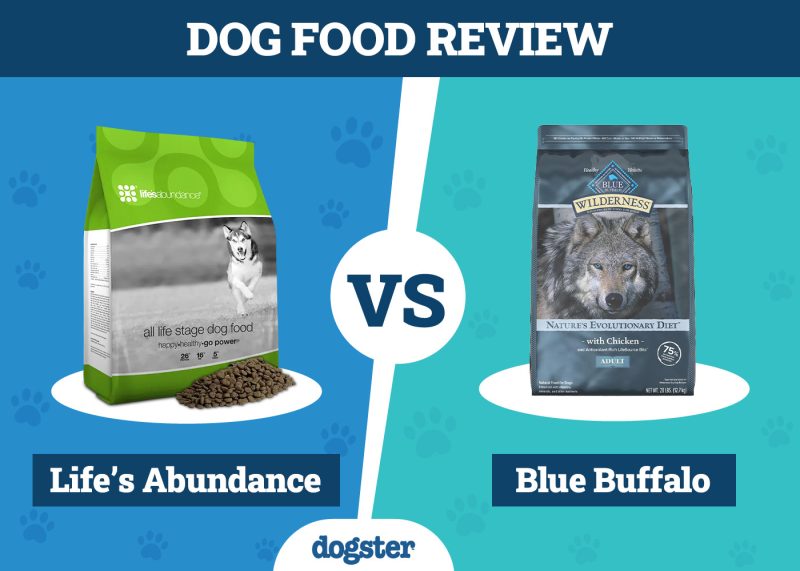In this article
View 8 More +If you’re searching for a purebred dog that loves to hunt and is still friendly, affectionate, and gentle, then the German Longhaired Pointer might be just the pet for you. This purebred pup hails from Germany and is capable of following a scent on land and in water, pointing at prey, and even retrieving it for you.
Breed Overview
Height:
23-28 inches
Weight:
55-80 pounds
Lifespan:
12-15 years
Colors:
White and chocolate, dark chocolate, roan, brown roan
Suitable for:
Single people, people who hunt, active families, experienced dog owners
Temperament:
Gentle, active, intelligent, affectionate, loving, friendly, kind
This breed has been a favorite of the hunting community for many years, but they also make great dogs for an active family or even a single person. However, it’s best for this breed to be adopted by someone who is already an experienced dog owner, so they can be trained properly.
If you’re thinking of adopting one of these gorgeous dogs as your own, you should first read the guide below, just to ensure you’re ready to give this pup a forever home.
German Longhaired Pointer Characteristics

German Longhaired Pointer Puppies
It’s important to note that German Longhaired Pointer puppies need to be exercised quite a bit to keep them healthy, happy, and free from getting bored. Remember, a bored puppy, no matter the breed, can quickly become a destructive puppy.
Your German Longhaired Pointer puppy will also need to be active and trained well to be happy. It’s important to remember that this breed is a huge and active responsibility. If you’re constantly active and love to be outdoors, then continue reading. If you’re more of a homebody that likes to be inside, this breed might not be the best choice for you.

Temperament & Intelligence of the German Longhaired Pointer
If you’re looking for a dog that is smart, gentle, and loyal, you’ve found one in the German Longhaired Pointer. Primarily bred for working and hunting, the German Longhaired Pointer’s temperament is adaptable and even, making them the perfect pet for any active family. However, they do need constant exercise, and if they don’t get it, they can become aggressive and destructive.
Are These Dogs Good for Families?🏡
If you’re an active family who enjoys heading out to swim, hike, and anything to do with the great outdoors, then the German Longhaired Pointer will make you a great pet. Although they have a lot of energy and are gentle, they are a large breed, so they might not be great to have around small children.
However, if German Longhaired Pointer puppies are trained and socialized while young, they can make a family a loyal, protective, and fun dog.
Does This Breed Get Along with Other Pets?🐶 😽
While this breed is bred for hunting and has a strong prey drive, they can be trained to get along well with other household pets. You need to train and socialize them early on and keep up with that training as they get older. They could possibly look at small pets as prey if you don’t.

Things to Know When Owning a German Longhaired Pointer
Now that you know a little about the German Longhaired Pointer breed, you can begin to make up your mind as to whether this particular pet is suitable to bring into your home. In our next section, we’ll give you some information on food and diet requirements, exercise, health conditions, and any other things you need to know about this pup before making your final decision.
Food & Diet Requirements🦴
Since your German Longhaired Pointer is a high-energy pup, it stands to reason that he’ll have a high metabolism as well. His food and diet should match that metabolism. It’s best to feed your pup high-quality kibble and give it to him in two different meals throughout the day. Feed him 2-3 cups of quality kibble, and supplement that with tinned food and quality lean meats for the best results.
Be careful with mealtimes, as this breed loves to eat and can easily overeat, making them gain weight and possibly become obese. If you’re unsure of how much to feed your pet or he seems to be gaining weight, make an appointment with your vet to determine the right amount of food to give him and a good diet to put him on.
Exercise🐕
As previously mentioned, the German Longhaired Pointer is a high-energy dog and is going to need more than a brisk walk around the block every day to keep him healthy and happy. Since they were born to work, a farm or a house with a huge backyard for them to run in is ideal. You need to walk your pup at least twice a day for 60 to 90 minutes to keep him happy, healthy, and out of mischief. A dedicated exercise routine is best for this type of dog, with plenty of playing ball, swimming, or running in the plan.
Training🦮
Since this breed is so intelligent, they are pretty easy to handle in the training department and get along well with humans. However, they do tend to become distracted easily, so an experienced owner is best if you want this dog to listen.
When training, keep the sessions short, so your pup doesn’t get bored and want to move on to doing something else. However, it is essential for training and socialization to be consistent for the best results.
Grooming ✂️
This breed needs to be brushed often. Since they love to be outside as much as possible, you can expect your pet to be muddy and dirty on a regular basis. However, give your pet a bath using shampoo very infrequently. If your pet gets muddy, simply rinse him down and dry him for the best results.
Health and Conditions❤️
As with any dog breed out there, the German Longhaired Pointer has a few severe and minor conditions you’ll need to be on the lookout for. We’ll go into a few of those conditions below.
- Food allergies
- Bloating
- Obesity
- Dental Issues
- Skin allergies
- Distichiasis
- Heart disease
- Cancer
- Hip dysplasia
- von Willbrand’s disease
- Patella luxation
- Progessive retinal atrophy
Male vs. Female
Now that you know all there is to know about the German Longhaired Pointer and still feel that this is the best choice to make your family pet, you need to choose between the male and the female of the breed. The males of the species are usually quite a bit taller than the females. They tend to be at least 20 pounds heavier than their female counterparts.
The males of the breed are also the most energetic and a lot harder to wear out. The males are more muscular as well. Females are happy to be on their own going about their own business, while the males tend to be more dependent on their owners and crave quite a bit of attention.
They are both gentle, sweet dogs that love to hunt and be outdoors. The choice of which you want is up to you; just know that both are great with the right training and socialization.

3 Little-Known Facts About the German Longhaired Pointer
1. German Longhaired Pointers Are Extremely Active
Your German Longhaired Pointer puppy is going to have boundless amounts of energy, so make sure you can keep up. They are a huge responsibility because they never seem to tire out, and you’ll have to work them hard to do so if it’s possible.
2. German Longhaired Pointers Are Loyal and Affectionate
Though this breed loves to be outdoors and exercise constantly, they’re also loyal and affectionate and can be found cuddling on the couch with their pet parent on occasion as well.
3. German Longhaired Pointers Can Do More Than Hunt
This breed is exceptionally skilled at hunting, but that’s not all they can do. They are highly intelligent and have feet that are webbed, so they do great competitions involving swimming or agility.

Conclusion
This concludes our guide on the German Longhaired Pointer breed and what you should know before giving one of these gentle yet energetic animals a forever home. They make great pets for active people, but you need to be sure that you have the energy to keep up with them and train and socialize them properly. If you have what it takes to raise this breed, then you’ll have a best friend for many years to come.
See also:
- Male vs. Female German Shorthaired Pointers: What Are the Differences?
- 20 German Dog Breeds (With Pictures)
Featured Image Credit to: Hebi B., Pixabay




















